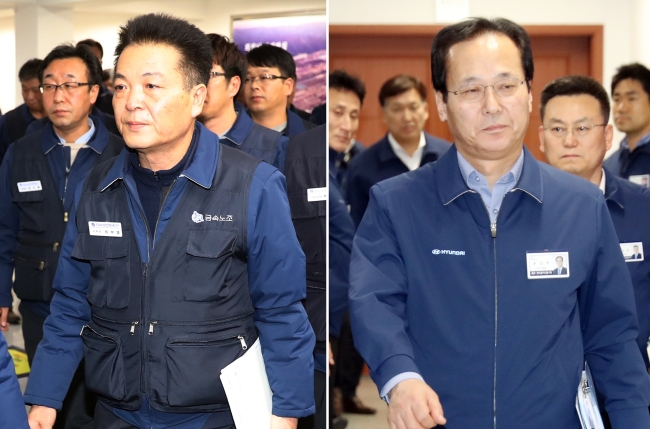Hyundai Motor labor, management reach tentative wage agreement
By YonhapPublished : Dec. 19, 2017 - 21:06
Hyundai Motor Co.'s union and management reached a tentative wage deal, ending concerns that protracted talks, possibly extending into the new year, could further hurt the company already struggling to cope with tough times, corporate sources said Tuesday.
After 39 rounds of negotiations, union leaders at South Korea's No. 1 carmaker accepted a revised wage package offered by the company, union spokesman Hong Jae-gwan said over the phone.
After 39 rounds of negotiations, union leaders at South Korea's No. 1 carmaker accepted a revised wage package offered by the company, union spokesman Hong Jae-gwan said over the phone.

In its revised offerings, the company said it will raise workers' basic monthly wages by 58,000 won ($53) and provide bonuses worth 300 percent of basic pay plus 3 million won in extra compensation, the union said.
The union initially demanded Hyundai raise workers' basic monthly wages by 154,883 won and offer a bonus of 30 percent of the company's 2016 full-year net profit of 5.72 trillion won.
The company, however, countered that it could provide a salary increase of 42,879 won per month and bonuses worth 200 percent of basic pay plus 1 million won in incentives. When that offer was rejected by the union, the company suggested bonuses of 250 percent of basic pay plus 1.5 million won in extra compensation as a revised offer.
"The company and the union reached a (tentative) agreement in this year's wage deal as the two sides took the company's deteriorating operating profits seriously amid unfriendly business environments," Hyundai Motor said in a statement.
The agreement will be put to a vote on Friday by the 51,000-member union members for final approval.
This year, industrial actions by the union have cost the company 1.31 trillion won, or 62,600 vehicles, in production losses, the company said.
Labor strikes have plagued the carmaker for decades. Its workers have walked out every year since 1986 except for 1994, 2009, 2010 and 2011.
Hyundai Motor currently operates seven plants in Korea, including five in the port city of Ulsan. It also has production facilities in the United States, Europe and emerging countries such as China, India and Russia.
In the January-September period, net profit fell 30 percent to 3.26 trillion won from 4.65 trillion won a year earlier due to a lack of new models and sharp sales declines in China in the wake of a bilateral diplomatic row over the deployment of a U.S. anti-missile system in South Korea. (Yonhap)




![[Herald Interview] 'Amid aging population, Korea to invite more young professionals from overseas'](http://res.heraldm.com/phpwas/restmb_idxmake.php?idx=644&simg=/content/image/2024/04/24/20240424050844_0.jpg&u=20240424200058)















